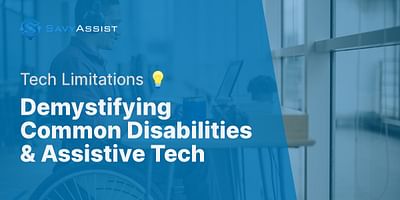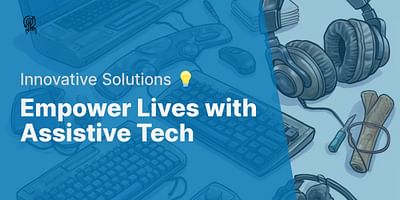Peter is a committed product manager, specializing in the development of technology designed to aid individuals with disabilities. His portfolio boasts a range of projects that leverage AI and machine learning to enhance accessibility. Peter continually seeks innovative methods to make technology more inclusive and accessible.
Assistive technology plays a crucial role in empowering individuals with intellectual disabilities to lead independent lives. By providing specialized tools and resources, assistive technology helps bridge the gap between their abilities and the demands of everyday life. In this article, I will explore the various ways in which assistive technology can enhance independence for people with intellectual disabilities.
1. Communication: Assistive technology offers a range of solutions to support communication for individuals with intellectual disabilities. Speech-to-text software enables them to convert spoken language into written text, making it easier to express their thoughts and ideas. On the other hand, text-to-speech software allows written text to be read aloud, aiding those who struggle with reading or have dyslexia. These tools promote effective communication, enabling individuals to express themselves clearly and engage in meaningful interactions.
2. Learning and Education: Assistive technology can significantly enhance learning opportunities for individuals with intellectual disabilities. Specialized software and apps provide personalized learning experiences, catering to different learning styles and abilities. For example, there are applications that offer visual and interactive learning tools, making complex concepts more accessible and engaging. Additionally, speech recognition software can assist students in capturing their thoughts and ideas, helping them overcome writing challenges. These tools foster independence in learning, allowing individuals to acquire knowledge and skills at their own pace.
3. Daily Living and Organization: Assistive technology offers a wide range of aids to support daily living and organization for individuals with intellectual disabilities. One-handed keyboards and adaptive switches enable those with physical limitations to operate computers and mobile devices more easily. Calendar and reminder apps help individuals stay organized, manage appointments, and complete tasks independently. Additionally, there are apps specifically designed to assist with personal care, such as medication reminders and hygiene routines. These tools promote self-reliance and enable individuals to manage their daily lives more effectively.
4. Access to Information: Accessible web design and mobile apps are essential for individuals with intellectual disabilities to access information and participate fully in society. Websites and applications that adhere to accessibility guidelines ensure that content is perceivable, operable, and understandable for all users. This includes features such as alternative text for images, clear navigation, and adjustable font sizes. By making digital content more accessible, individuals with intellectual disabilities can access information, engage in online activities, and stay connected with others.
In conclusion, assistive technology plays a vital role in empowering individuals with intellectual disabilities to lead independent lives. By addressing communication barriers, enhancing learning opportunities, supporting daily living, and ensuring access to information, assistive technology enables individuals to overcome challenges and participate fully in society. It is crucial to continue developing and promoting inclusive technology to create a more accessible and inclusive world for everyone.















